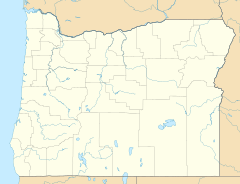Sterlingville, Oregon facts for kids
Quick facts for kids
Sterlingville, Oregon
|
|
|---|---|
| Country | United States |
| State | Oregon |
| County | Jackson |
| Elevation | 2,726 ft (831 m) |
| Time zone | UTC-8 (Pacific (PST)) |
| • Summer (DST) | UTC-7 (PDT) |
| GNIS feature ID | 1165994 |
| Coordinates and elevation from Geographic Names Information System | |
Sterlingville was a small town in Jackson County, Oregon, USA. It was once a very busy place because of gold mining. This town had the biggest hydraulic mine in Oregon. Today, Sterlingville is an abandoned place, and the old town is gone.
Contents
The Story of Sterlingville
How Gold Started a Town
Sterlingville began in 1854. Two miners, James Sterling and Aaron Davis, found gold in Sterling Creek. News of the gold spread quickly. Within two years, over 800 people moved to Sterlingville.
The town grew fast. It had many buildings like general stores, a warehouse, and places to stay called boarding houses. There was also a bakery, a casino, and a dance hall. People could visit saloons, a blacksmith shop, and a barber shop. Many houses were built too.
At its busiest time, Sterlingville had more than 1,500 people living there.
Big Mining Operations
In 1869, the Sterlingville School District was started. Later, in 1877, a new company called Sterling Mine Company built something important. They built the Sterling Ditch. This ditch moved water about 23 miles (37 km) from the Little Applegate River. The water was used for hydraulic mining to find gold and chromite.
The Sterling Mine quickly became the largest hydraulic mine in Oregon. It might have been the biggest in the entire western United States. The water source for the Sterling Ditch was 120 feet (37 m) higher than the mine. This height used gravity to push water through three large nozzles. These nozzles were 5 inches (13 cm) wide. Captain A. P. Ankeny, who owned the Sterling Mine Company, made over $64,000 from the gold.
The Town's Decline
A post office was built in Sterlingville in 1879. But as the gold started to run out, fewer people lived in the town. In 1883, the post office closed down. By 1910, the big hydraulic mining operations had stopped. The school district also closed in 1937.
A Brief Comeback
During the Great Depression, Sterlingville saw some mining again. Mines operated from 1933 to 1957. However, this mining caused a lot of damage to the land. It washed away almost all the soil and moved huge piles of rocks downstream. After these mines closed, the town was completely abandoned and destroyed.
 | Selma Burke |
 | Pauline Powell Burns |
 | Frederick J. Brown |
 | Robert Blackburn |



